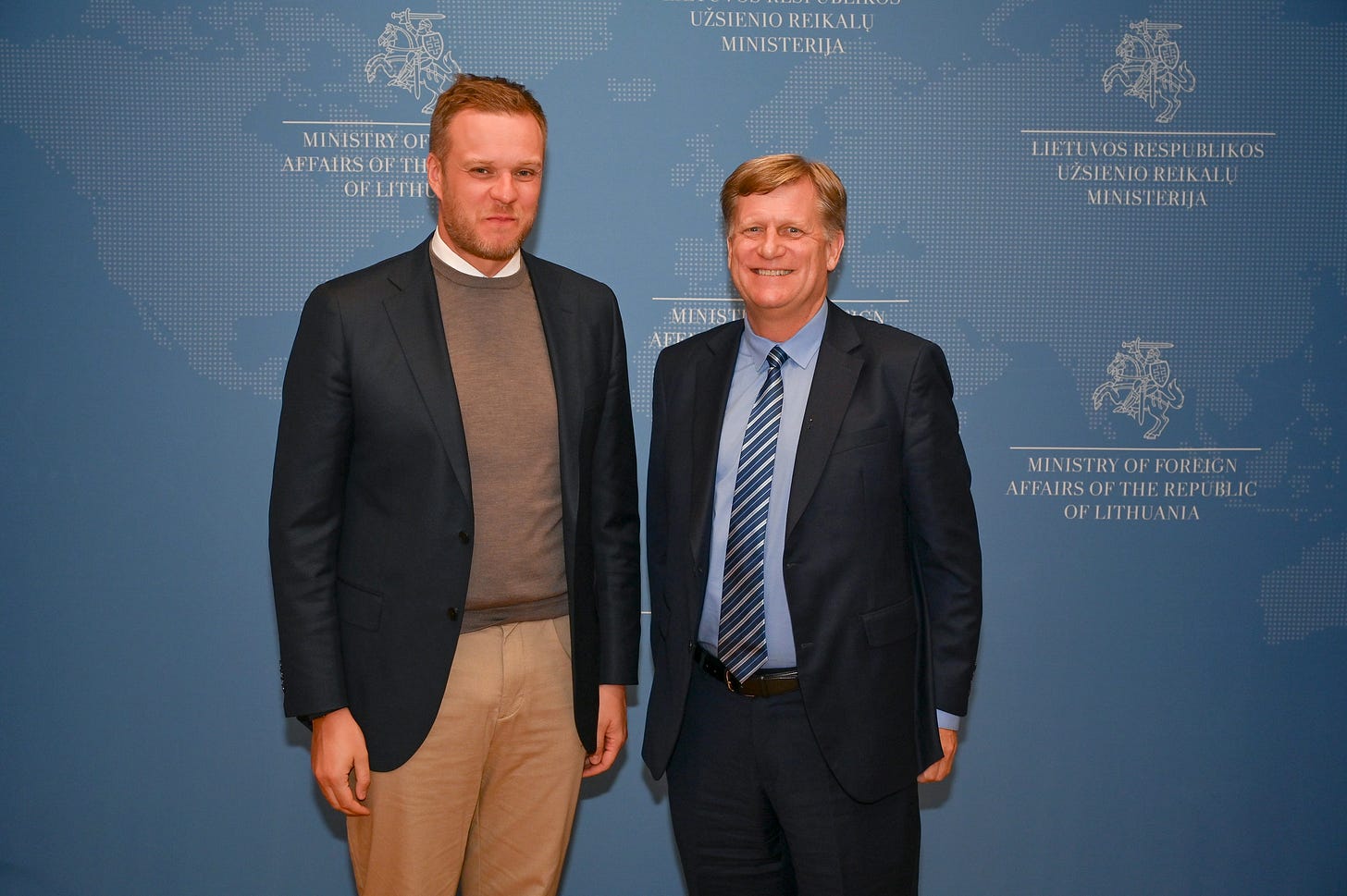The Collateral Damage to America’s Reputation from Not Approving New Aid to Ukraine
But this damage can be mitigated by getting this vital piece of business done as soon as possible
As part of the Snow Meeting hosted by the Ministry of Foreign Affairs of Lithuania, I spent last week in Vilnius, meeting with government officials, including Prime Minister Ingrida Šimonytė and Foreign Minister Gabrielius Landsbergis, other senior European officials, think tank analysts, and leaders of the Russian and Belarusian opposition living in exile in Lithuania.
I learned a lot and will post several reflections in the coming days. Today, however, I want to start with my biggest takeaway – the collateral damage being done to American credibility by delaying new assistance to Ukraine.
I have explained many times why this new package of assistance to Ukraine is important for American values and interests. (For a detailed case, see my article in Foreign Policy called The Case for Supporting Ukraine Is Crystal Clear.) In a war between democrats and autocrats, we – the United States government and the American people – want to be on the side of those fighting for democracy. In a war in which Russian leader Vladimir Putin has already been indicted for committing crimes against humanity, we want to be on the side of those trying to defend themselves from these injustices. In a war in which Putin seeks to annex huge chunks of Ukrainian territory, we want to support the side that is seeking to defend the liberal international order in which annexation is prohibited.
Moreover, helping Ukraine weaken and stop Putin’s invading forces directly serves U.S. security interests. Russia’s army threatens our European allies and our soldiers based in those countries. Conversely, Putin’s victory in Ukraine will make our allies in the region even more nervous. And they are already nervous! In Vilnius, I heard that message repeatedly from leaders of Lithuania, Estonia, Latvia, and Poland. If Putin wins, we will have to spend more resources and deploy more American soldiers to enhance deterrence and keep the peace in that part of the world.
The linkages between security in Europe and Asia are also obvious. Putin’s defeat in Ukraine will help deter Xi from invading Taiwan. Conversely, Putin’s victory will make Xi less nervous about launching a coercive operation against Taiwan. The interests of China and Russia align in this war. Xi is already providing his friend in Moscow with technological components to help the Russian industrial complex build more missiles to target Ukrainian cities. For a detailed accounting of these transfers, read Working Group Paper #16 Challenges of Export Controls Enforcement How Russia Continues to Import Components for Its Military Production. The Iranians and North Koreans are also helping Russia. A win for Russia is a win for this entire coalition, an outcome that does not serve American national security interests.
So, providing new military aid to Ukraine is essential for defending our values and interests. This was obvious to me before visiting Lithuania. (I summarized these arguments in an 8-minute mini-lecture at Stanford here) What I did not fully appreciate until this trip, however, was how delays in providing assistance have already damaged our reputation as a reliable partner and ally. Our European allies worry that we have become too consumed with our internal debates – too polarized in our politics – to recognize our own national security interests clearly. I heard lots of references to the 1930s when American isolationist tendencies allowed Hitler to annex territory and then attack Poland and other European countries while we stood on the sidelines. (For more on that analogous history, read Robert Kagan’s The Ghost at the Feast: America and the Collapse of World Order, 1900-1941. The parallels to today are haunting.) We also showed indifference to Italian, Japanese, and Soviet aggression in the early years of World War II. Both the Soviet Union and Germany had invaded Lithuania sequentially before we even entered that war. (If you ever visit Vilnius, be sure to visit as I did last week the Museum of Occupations and Freedom Fights to learn about this history.) My European colleagues wondered out loud with me whether we were entering a similar period of American disengagement in which Europe would have to deal with the Russian threat alone, without us. Of course, the specter of Mr. Trump returning to power also loomed in every conversation. Everyone was worried about such a possibility and the damage Trump’s second administration might do both to Ukraine’s ability to defend its territory but also to NATO. Just this week after winning the Iowa Caucus, Trump reaffirmed his commitment to “America First.” That phrase, of course, first became popular in the 1930s.
I tried to assure my colleagues that most Members of Congress still supported new assistance to Ukraine and understood how this assistance is not charity, but an investment in American security interests. I explained that the aid package to Ukraine got tangled up in domestic politics around border security, which now is being further politicized by some Republicans who don’t want to give Biden a win on this issue before the presidential election in November. I acknowledged the parallels to the 1930s but also tried to highlight some differences, including the fact that we are not midstream of a Global Depression, and still have many political leaders in both the Republican and Democratic parties that believe in international engagement as the best strategy for advancing American security and economic interests. The current president is one of them. Republican leaders on foreign affairs in both the House and Senate are too. But I was on the defensive in most of these conversations. I felt a real nervousness from my interlocutors. They were genuinely worried about the American commitment to remain a loyal ally and a strategic anchor for the free world.
It is not too late for Congress to do the right thing and quell these anxieties among our European allies. A vote on new aid for Ukraine is not only vital for Ukraine’s ability to fight the invading Russian army but critical for restoring our reputation as a reliable partner and trusted ally. The sooner this vote occurs, the better for all.
P.S. At the Snow Meeting, it really snowed!





Speaker Johnson and his MAGA coterie are clearly in thrall to Donald Trump, who is in thrall to Putin. Johnson has not done a very good job of concealing the fact that his preferred outcome is no aid for Ukraine and no solution for border issues, so that MAGA types can make political hay during election season.
It's time for the Biden administration to stop negotiating and start playing hardball. Everyone knows what must be done -- seize the House from Republican extremists and hand it over to a moderate coalition of Democrats and Republicans. Pretending that a decent outcome is possible with a Speaker who is only pretending to negotiate is not the way out of this situation. There are political tools that can be used, and the time has come to use them.
Along with wondering when/whether the US is going to renew aid to Ukraine, are our European allies also doing everything they can to increase support? I know they provide support already (lots of graphs posted recently showing how much), but I was curious what you may have heard at the meeting about additional steps and plans they may have. Because it seems clear that they might need a Plan B.